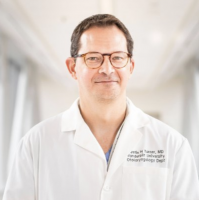In anticipation of Justin Turner, M.D., Ph.D., officially assuming the chair role in the UAB Department of Otolaryngology in May of 2024, we recently reached out to Dr. Turner inquiring about his visionary plans and goals for propelling patient care, educational initiatives, technological advancements, and fostering collaborative efforts among members of the department.
1. What are some experiences in your medical career that led you to specialize in otolaryngology?
My path may be different than most because I was in a combined MD/PhD program. Students in those programs are frequently encouraged to pursue internal medicine or related specialties to facilitate research careers and protect their time. I had planned for that, but during a 2-week elective in my third year of medical school, I rotated on the otolaryngology service, and the rest is history. The specialty encompasses multiple complex organ systems and reflects a perfect balance between medical and surgical care. The patients were always appreciative, and I would go home at the end of the day feeling as if I had positively impacted their quality of life.
2. How do you envision enhancing patient care, educational, and research initiatives within the department, and how do you plan to contribute towards these areas?
The healthcare landscape is rapidly changing, particularly within academic medical centers. This brings challenges, but also new opportunities. My vision for this department is to sustain and develop all aspects of the academic mission in a way that is both innovative and practical. Our focus as a department should be on providing the best care for patients, now and ten or more years into the future. This requires sustained investment in new clinical programs, support for basic and clinical research, and a focus on recruiting the best and brightest faculty and trainees to our program. I believe that the most important thing I can do as department chair is to lead by example. I love all aspects of the academic mission; including teaching residents and fellows and watching their careers develop. I love seeing patients, providing quality care, and continuing my own medical education. Lastly, I love translating basic science discoveries into impactful changes at the bedside. A career that encompasses parts or all of these activities can be extremely rewarding.
3. How do you plan to keep the department at the forefront of technological and treatment advancements; what emerging trends do you believe are particularly relevant to our department's future success?
Medical technology and patient care are changing at an incredible pace. This requires the dissemination of research and technological advancements in the field with a focus on continuing medical education for our providers. I will support new departmental courses and conferences on a wide variety of topics that will help to educate our faculty and providers from throughout the region. Additionally, we will support our faculty to share their advancements and discoveries nationally and internationally. We will bring experts in the field to UAB to do the same. Looking forward, I see new discoveries and therapeutics shifting many ear nose and throat diagnoses to medical rather than surgical diseases. We are already seeing this with the introduction of new and highly effective immunomodulators for treating head and neck cancers and nasal polyps. We must recognize the need to change and adjust our care models as these innovative treatments become available.
4. How do you plan to foster collaboration and a positive working environment among the faculty and staff?
The success of any organization is a result of unique contributions and shared sacrifices of each employee. Studies have shown that individuals remain engaged when they feel appreciated for their contributions and they have a sense of belonging within the greater organizational structure. For clinical departments that have been historically characterized by hierarchical structures, this means recognizing and valuing the individuals who make the system work. It means fostering an environment where people feel free to ask questions and provide input. Finally, it means supporting faculty and staff as they develop their roles and careers within the department and institution.
5. As a mentor, what methods do you feel are important in the support and guidance of the next generation of otolaryngologists within the department?
There are multiple paths available to our trainees once they leave the department. However, certain key skills and strengths will facilitate their success regardless of what path they choose. As a mentor, I always invest heavily in education that occurs outside of the typical clinical and operating room environment. I want our graduates and early career faculty to be leaders in whatever role they pursue. This requires added instruction in non-clinical aspects of training, including leadership skills, public speaking, organizational structures, and finance. It is important to define mentorship structures early in training. Many leaders in otolaryngology point to role models who influenced their development or positively assisted their career trajectory. As chair, I want to facilitate the identification of resources and relationships that will lead to successful careers for all of our trainees.
The Department of Otolaryngology looks forward to welcoming Dr. Justin Turner this summer and is eager to work together in support of these goals to create a positive, transformative environment for our patients, providers, and staff alike under his leadership.